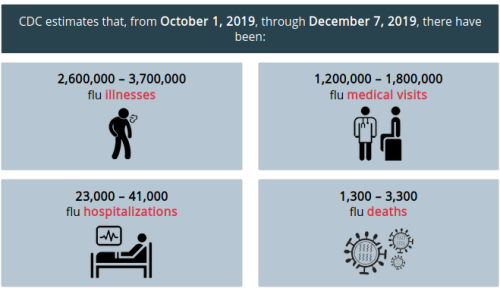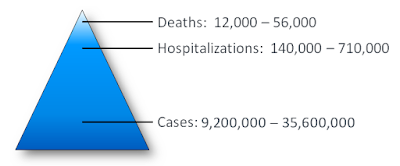
Photo Credit PHIL (Public Health Image Library)
#14,577
While it is still early days, and it is too soon to tell how this year's flu will compare to the past couple of unusually rough seasons (see 2018's CDC: More Than 900,000 Hospitalizations & 80,000 Deaths In Last Winter's Flu Season), the CDC has released an early in-season snapshot of this year's estimated burden from influenza.
If any other infectious disease had infected more than 3 million Americans - and killed more than 1300 - over the past couple of months, the nation would be in an uproar. Particularly since these numbers could easily increase 10 fold in the next couple of months.
But since its seasonal flu, it barely elicits a yawn.In an average year, influenza kills roughly as many Americans as does gun violence, or car accidents. In a bad year - such as we saw in 2017-2018, flu can kill as many as both of those combined.
The CDC has an `expected range' of seasonal influenza hospitalizations and deaths (see chart above), but as we learn more about the indirect effects of flu on cardiac conditions, and other chronic diseases, this range may need to be increased.
Increasingly influenza and other respiratory infections have been linked to a significant seasonal increase in heart attacks and strokes.
- Last September, in PLoS One: Transient Depression of Myocardial Function After Influenza Virus Infection, we looked at a study that found transient myocardial function changes among a small group of influenza patients studied.
- In 2018's NEJM: Acute Myocardial Infarction After Laboratory-Confirmed Influenza Infection, we saw a study that found a `significant association ' between recent (lab confirmed) influenza infection and Myocardial Infarction.
- And in May 2017, in Int. Med. J.: Triggering Of Acute M.I. By Respiratory Infection we looked at research from the University of Sydney that found the risk of a heart attack is increased 17-fold in the week following a respiratory infection such as influenza or pneumonia.
- In 2015, in UNSW: Flu Vaccine Provides Significant Protection Against Heart Attacks,we saw a study that found that if you are over 50 - getting the flu vaccine can cut your risk of a heart attack by up to 45%.
- Last year, a study appearing the American Heart Association's journal Circulation, found a substantial reduction in deaths among heart failure patients who received a yearly flu shot (see AHA: Study Shows Flu Shots Reduce Deaths From Heart Failure).
- Last January, in Chest: Flu Vaccine Reduces Severe Outcomes Among Hospitalized Patients With COPD, researchers found a lower mortality rate, less critical illness, and a 38% reduction in influenza-related hospitalizations in vaccinated vs unvaccinated individuals.
- And earlier this summer, in Flu Vaccine May Lower Stroke Risk in Elderly ICU Patients, we saw a study that found influenza vaccinated ICU survivors had a lower 1-year risk of stroke and a lower 1-year risk of death than unvaccinated survivors.
This from the CDC:
Flu Vaccine Reduces Serious Flu Outcomes
Flu vaccination has been shown to reduce flu illnesses and more serious flu outcomes that can result in hospitalization or even death in older people. For example, a 2017 study showed that flu vaccination reduced deaths, intensive care unit (ICU) admissions, ICU length of stay, and overall duration of hospitalization among hospitalized flu patients; with the greatest benefits being observed among people 65 years of age and older.
I view getting a yearly flu shot like always wearing a seat belt in an automobile. It doesn't guarantee a good outcome in a wreck, but it sure increases your odds of walking away.
And that, to me, is an extra bit of insurance worth having.



